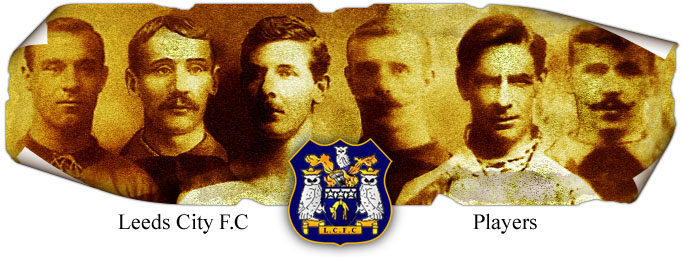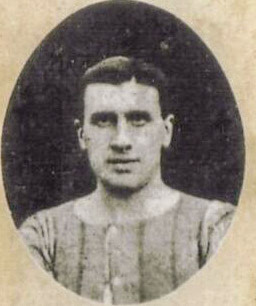

Hamilton: John H. (Jock)
1908-1909 (Leeds City Player Details)
Centre Half
Born: Bonnyton, Fife, Scotland: 28-02-1879
Debut: v Tottenham Hotspur (h): 05-09-1908
5’11” 12st 7lb (1907)
Hamilton started with Lochgelly United but moved in 1903 to Cowdenbeath for one season and then, in 1904, to Dunfirmline Athletic and
after one season there he moved to the Scottish Second Division, Leith Athletic in 1905, making just one appearance in the1904-05 season
but then became a regular making nineteen League and nine Cup appearances in 1905-06 and twenty League and three Cup games in
1906-07. With forty League and twelve Cup games under his belt before heading south to join Southern League First Division club Brentford
in the 1907-08 closed season. He played twenty-two Southern League games and two F.A. Cup games for the Bees. From there he moved
to Leeds City in June 1908.He was one of the first signings made by new Leeds City secretary-manager Frank Scott-Walford in June 1908,
moving to Elland Road with Brentford team mates Jock Watson, Tom McAllister and Adam Bowman. The four men were all in the City side
that opened the season at home to Tottenham on 5th September 1908. Hamilton did well enough and played in eight of City's first ten games.
A strong centre-half he was soon converted to other roles to broaden his adaptability. City soon found that apart from his favourite Centre
Half position he was also equally adept in most defensive positions, turning out at Right Half and both Full Back positions as the need arose.
He went on to make twenty-one League and four Cup appearances in the campaign, a few of which were at full-back in the closing weeks,
as he demonstrated his versatility. Having played twenty-one of the thirty-eight games and figured in all four F.A. Cup ties, it came as quite a
surprise when he returned to Brentford at the end of the season. He spent the next three years with the Bees, in 1909-10 making twenty-
eight League and two F.A. Cup appearances. He scored his only only League goal in 1910-11 missing only one game with thirty-seven
games in the Southern League and one in the F.A. Cup. There were another twenty-two League and five in the F.A. Cup in 1911-12. A total
of one League goal in one hundred and nine League and ten F.A. Cup games in his second spell at Griffin Park and a total of one League
goal in one-hundred and thirty-one League and twelve F.A. Cup appearances. He moved on to the newly-elected Second Division of the
Southern League team, Swansea Town and 1912–13 Swansea Town A.F.C. season. The 1912–13 season was the first season in which
Swansea Town (now known as Swansea City) took part in league and cup football. The club was elected to Division Two of the Southern
Football League. Swansea's first official match was played on 7 September 1912 against local rivals Cardiff City at the Vetch Field. All of
Swansea's home games for the 1912–13 season were played on a 'Clinker pitch'. After a twenty-four League game season the club
finished third, narrowly missing out on promotion, with Hamilton scoring once in nineteen League games. The goal came on 21st March
1913 in a home game against Croyden Common, getting Swansea full points with the only goal of the game in front of a 10,000 crowd.
The club also entered the Welsh Cup and won it at the first attempt, beating Pontypridd 1–0 in a re-played final, as Hamilton played seven
games in that tournament. Like many footballers, and other fit young men of the time, he joined the Army for sevice in France in WW1. There
are many Hamiltons from Scotland with similar christian names and dates of birth, but this was noted as being Jock Hamilton Swansea
Town Captain. He joined the Argyll and Sutherland Highlanders and was later in the Machine Gun Corps. He was awarded a Military Medal
on 2nd November 1917. He was stationed at Edinburgh Castle in September 1915. In the Edinburgh Evening News, 16th September 1915:
"For their match in the Penman Cup tie at Armadale on Saturday, Leith will turn out an old Logie Green favourite in "Jock" Hamilton. Hamilton
is at present in the Argyll and Sutherland Highlanders stationed in the Castle, and will play for the Leith team during his stay there. The only
residents of the castle were the Argyll and Sutherland Highlanders 3rd or 4th Reserves. The 249th Machine Gun Corp is thought to have been
attached to the 18th Indian Division. The 249th Machine Gun Company left Grantham on 16th July, 1917, disembarked at Le Havre on 17th
July 1917. It joined the 14th (Light) Division at Westoutre on 21st July 1917. As part of the 14th (Light) Division, it may have seen service in
the following battles and engagements: 1917 Battles Of Ypres, 18th August 1917, Battle of Langemarck [II Corps, Fifth Army]. 22nd to 26th
August 1917 Fighting on the Marne [II Corps, Fifth Army]. The Company left the 14th (Light) Division on 4th October 1917 (it was replaced by
224th MG Company). It reached Marseille on 15th October 1917. It arrived in Mesopotamia on 13th November 1917 and joined18th (Indian)
Division on 5th February 1918. "Swansea sportsmen will be delighted to hear that Jock Hamilton, the popular ex-captain of the Swansea
Town Club, has been awarded the Military Medal. Since joining a Scottish regiment, in which, he has been at the front for over twelve months,
Jock has been once wounded and once I buried in a trench. The news of his distinction is conveyed in a letter to a friend at his home address.
Sgt. Hamilton says" I have Good news to tell you. I have won the Military Medal. I may tell you we are having it pretty hot. Of course, the
Germans are having it a bit warmer." It will be recalled that Sgt. Hamilton was the first captain the Swansea Town Association Club ever had.
He played consistently and well. but in the season before tho war he went down to Llannelly, where he installed himself a great favourite. Prior
to joining up Jock was engaged at the Swansea I I Docks. It seems that during the war years he played several games for nearby towns,
where he may have been stationed. He finished his football career with Barry Town, seeing out his latter years with them. After retiring he
went back to Scotland. He died in Leith on 17th April 1946.
| Appearances | Goals |
| League 21 | 0 |
| F.A. Cup 4 | 0 |